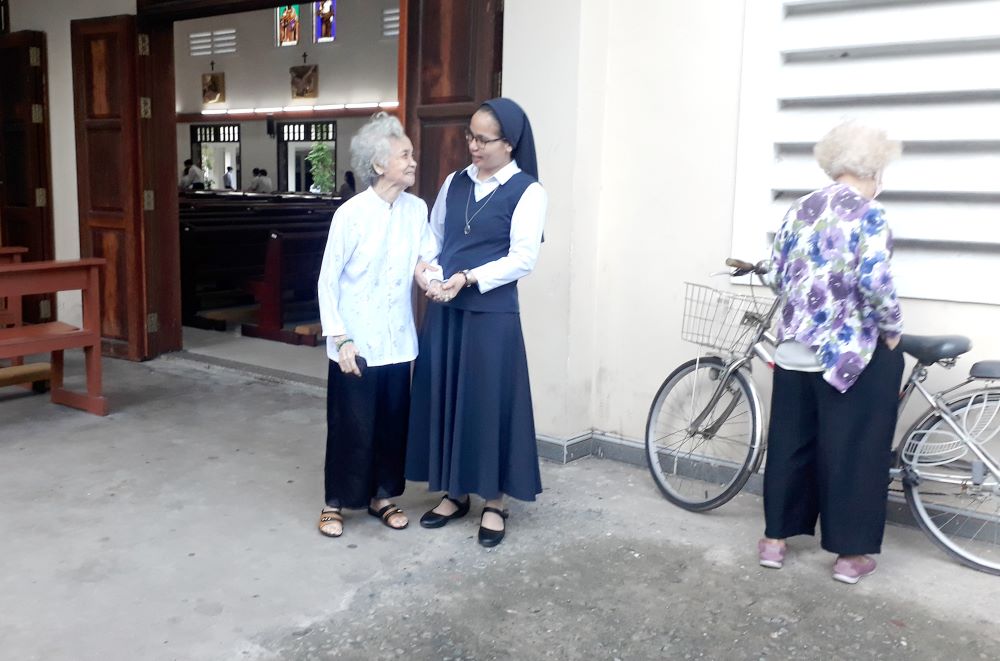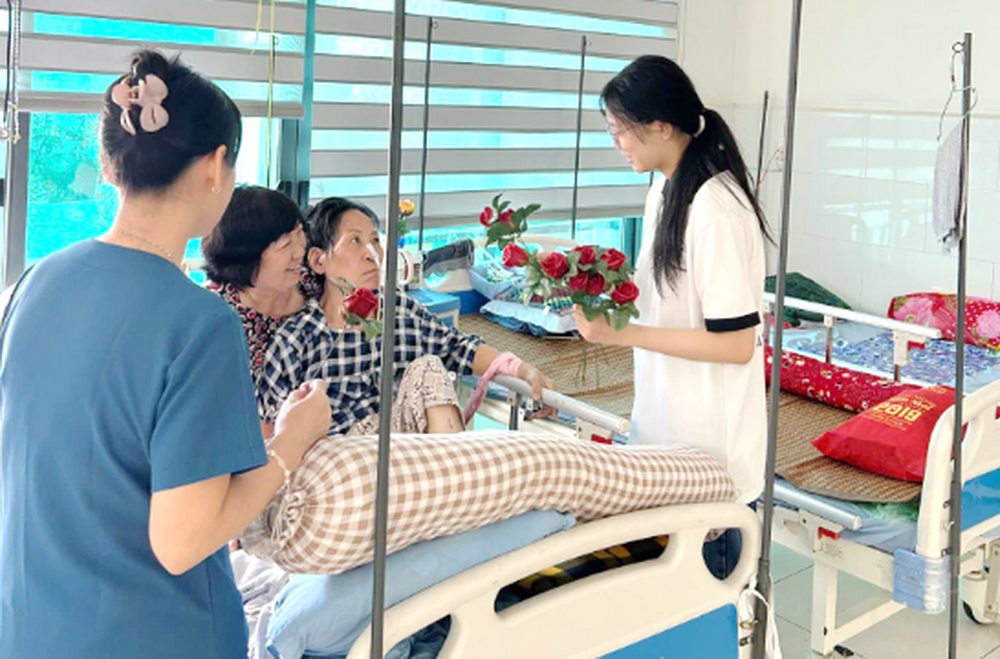
Sr. Anna Huynh Thi Dien talks with Nguyen Thi Nhai, an elderly woman without relatives, at Dong Hoa Church in Binh Duong province in Vietnam May 25. (Joachim Pham)
Do Thi Kim Huong lay quietly in her bed at Thuan An Hospital, recovering from a severe bout of gastritis.
Gaunt and visibly exhausted, the 45-year-old sanitation worker from Dong Nai province never imagined a group of Catholic nuns would visit her. Yet, on a quiet Saturday morning, they arrived with fresh roses.
"Every Saturday, they bring me roses," Huong told Global Sisters Report. "Though I'm Buddhist, I feel embraced by God's love through them. No one has ever given me flowers before."
Huong had been hospitalized for 20 days and was discharged on June 11. She and her husband both work in waste collection to support their two children.
The sisters did not bring a medical cure, but their visits offered something perhaps more powerful: compassion, solidarity and human dignity. Along with flowers, they brought Huong food, financial aid and spiritual comfort.
In Binh Duong, which was merged with Ho Chi Minh City on July 1 and is one of Vietnam's most industrialized provinces, the Little Sisters of the Assumption quietly serve the working poor — accompanying factory workers, elderly migrants and families displaced from rural areas in search of a better life.

Sr. Marie Hoang Thi Tuyet (second from left) and a novice from the Little Sisters of the Assumption offer roses to Do Kim Huong at Thuan An Hospital on May 24. (Joachim Pham)
"We understand the anguish of those who migrate for survival," said Sr. Therese Nguyen Thi Sau, who leads the sisters' community in Dong Hoa. "Our mission is to draw near — to listen, to accompany and to help carry the burdens they cannot bear alone. That's where the Gospel becomes real."
The community includes seven sisters and five novices based in the town of Di An. It provides holistic pastoral care by operating a preschool for workers' children, visiting patients in hospitals and homes, preparing free meals and working with Catholic students and young laborers.
"At the heart of their mission is presence. We don't serve the poor from a distance. We live among them. We learn their names. We witness their daily struggles," Sau told GSR.
Among those they serve is Gregory Vu Nguyen Dang, 37, who has worked in a wood-carving factory since 2017. His four-member family lives in a 30-square-meter rental room.
Originally from Quang Tri province, Dang earns about 17 million dong ($680) a month, but his income is quickly consumed by rent, food and school expenses.
His 4-year-old daughter is enrolled at the sisters' preschool, where 75% of the tuition is subsidized. "We trust the sisters to shape her character," he said. "They give us peace of mind so we can work."
While young workers face economic hardship, elderly migrants suffer from isolation.
A sanitation worker (left) buys vegetables for her family at Dong Hoa market in Binh Duong province on May 25. (Joachim Pham)
Joachim Truong Trong Nghia, 67, paralyzed in one leg, moved from Ha Tinh province to live with his daughter after his wife's death in 2018. Confined to a sterile high-rise apartment, he spends his days alone.
"It's lonely here. I cook, clean and sit in silence. You need a key card just to use the elevator. The neighbors' doors stay shut," he said.
The nuns visit Nghia weekly, bringing food and conversation. They even provide motorbike taxi fare so Nghia can attend Sunday Mass at Dong Hoa Church.
"They ask about my children," he told GSR. "They remind me that I still matter, that I'm still loved."
Recognizing how urban migration disrupts traditional support systems, the sisters emphasize emotional and psychological care.
Sr. Lucia Do Thi Dieu, who is trained in geriatric psychology, said she regularly visits 30 elderly residents like Nghia.
"Many struggle to adapt to high-rise living. They feel lost and ashamed. "Their children are overwhelmed with work. What they need is someone to simply listen — to see them," Dieu said.
Beyond spiritual companionship, she told GSR, the nuns offer tangible support: hot meals twice a week for 45 people, a "zero dong" shop offering free essentials, and inclusive early childhood education for children with developmental delays.
They also accompany over 100 college students who migrate to Binh Duong for education. On the last Sunday of each month, the sisters host the students for communal meals, sports, prayer and Eucharistic adoration.
"We've become like siblings here," said Lucia Huynh To Loan, a second-year nursing student. "The nuns make us feel at home even when we're far from our families."
Advertisement
Sr. Marie Ngo Ngoc Nhung, who oversees student ministry and vocations, views these gatherings as spiritually formative.
"On feast days, students join us in visiting the sick. These shared encounters help them grow in empathy, leadership and faith. It's how we evangelize — not with words, but with presence," Nhung said.
She told GSR that despite their growing impact, the sisters — who began their ministries in the Southeast Asian country in 2009 — remain few in number. They have three communities, located in Ho Chi Minh City and provinces of Binh Duong and Nghe An, with 40 members.
"We don't have abundant resources," Sau said. "But we do have hearts ready to go where the pain is raw and where companionship is needed most."
For Huong, the simple act of receiving a rose became a transformative moment. "When I see the nuns, I feel like someone still remembers me," she said.



